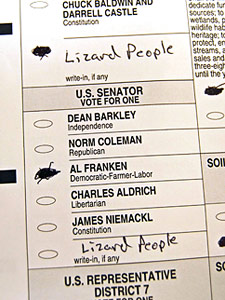U.S. Workers Admit Wasting 2 Hours Per Day
According to a recent survey, U.S. workers admit to wasting two hours–our one quarter–of every eight hour workday.
U.S. workers say they waste 2 hours a day (Reuters)
U.S. workers say they squander over two hours a day at the workplace, with surfing the Web, socializing with co-workers and simply “spacing out” among the top time-wasting activities, according to a survey released on Monday. Most U.S. companies assume about an hour of wasted time, but workers admit to actually frittering away more than twice as much time at a cost of $759 billion in annual paid salary that results in no apparent productivity, an online survey conducted by America Online and Salary.com showed. Wasted time did not include the standard lunch hour.
Of 10,044 employee respondents, 33 percent said they engaged in time-wasting activities because they didn’t have enough work to do. Nearly a quarter of those surveyed said they squandered their work hours because they were underpaid.
Men and women wasted an equal amount of time at work, but older workers were significantly more attentive than younger workers, the survey showed. Workers over 55 years old wasted an average of just 30 minutes a day, according to the survey.
Bill Coleman, senior vice president at Salary.com, said some time-wasting activities — such as personal use of the Internet — can be positive, resulting in new business ideas or a happier work environment. “There is such a thing as creative waste,” said Coleman. “Not all wasted time is bad.”
True enough. Especially for those doing mentally draining work, frequent breaks are likely quite productive. Still, one presumes that the self-reported two hours is a low estimate, given that most people, for example, consider themselves above average drivers or of above average intelligence.
Update (1434): Steven Taylor adds,
The thing about these kinds of studies that always strikes me is that they seem to assume that a 100% efficient workday is possible. However, it isn’t. There is no way that a human being can dedicate 100% of their work time to working—and what the real reasonable percentage is will depend on the work being performed. Further, if a person takes a break to chit-chat with a co-worker, or to check ESPN.com, it may well be that the 10-15 minutes spent doing that will result in a more productive 45-50 minutes of work for the remainder of the hour than might have resulted if the person had attempted to work the entire 60 minutes in question.
That’s certainly my experience.






I personally suspect this has been a constant over the years. People used to spend more time hanging out and chatting in the office or on the phone; now there’s less time for those because of all the time we’re spending on the Internet.
Likely quite true. For example, I spend no time at all hanging out at the water cooler, seeing as how my office doesn’t have one.
I think what it actually comes down to is that the 8-hour workday isn’t actually well suited to the kind of intellectual/administrative/creative office work the people in the survey likely do. It’s a holdover from industrial-era factory work. I’d say six hours a day is my maximum productive work under normal circumstances. Under a tight deadline, though, that can double for short bursts.
That reminds me. I need to check ESPN.com….
How else would I look at this site………..
I’ll stop browsing the internet and checking my e-mail at work when my bosses stop expecting me to answer my cell phone and blackberry 24 hours a day, 7 days a week, 365 days a year, even when I am sick or on vacation.